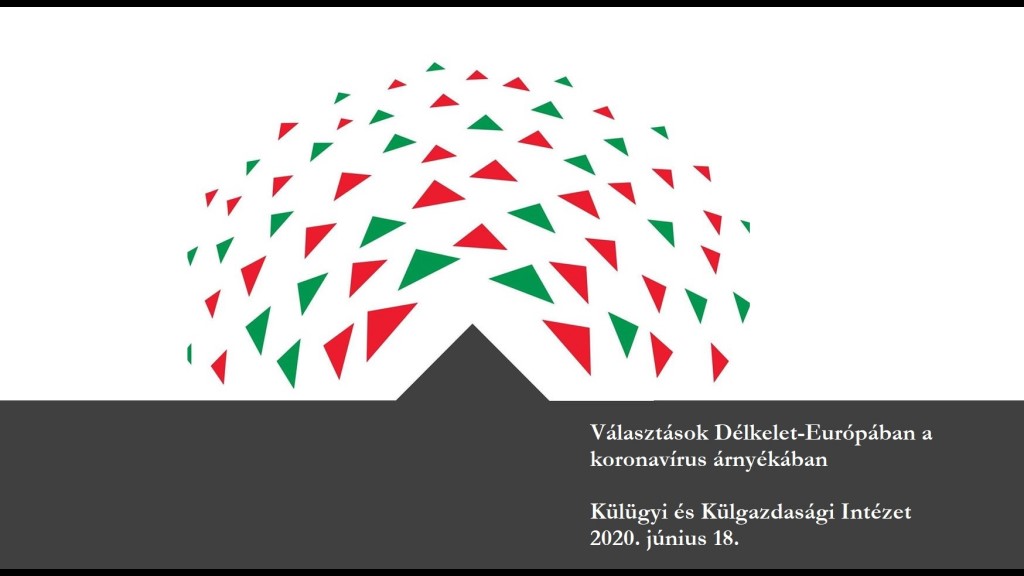The Institute for Foreign Affairs and Trade (IFAT) held on online roundtable discussion entitled “Elections in Southeast Europe in the shadow of the coronavirus” on 18 June 2020. The event was moderated by Nikolett Garai, IFAT Research Fellow, and the speakers were Anna Orosz, IFAT Research Fellow and Program Manager (Post-soviet region and the Balkans), Dr. Tibor Ördögh, Senior Lecturer at National University of Public Service, and Ferenc Németh, IFAT Research Fellow.
The discussion revolved around the parliamentary elections to be held in three countries of the Southeast European region – Serbia, Croatia, and North Macedonia – over the course of June and July. Panellists dwelled into the background and possible outcome of these elections as well as discussed how the coronavirus altered the campaign period and the political rhetoric.
Tibor Ördögh noted that the Serbian parliamentary elections were scheduled to be held in mid-April, however, as a consequence of the coronavirus and the state of emergency, it has been postponed to 21 June. Many experts believe that the results of these elections would not come as a surprise since the biggest party of the current coalition – the Serbian Progressive Party – holds an approximate support of 60 percent. Accordingly, the main question is not about the future composition of the government but about the parties that might be able to reach the lowered level of threshold (from five to three percent), and about the opposition these parties could possibly form. Mr. Ördögh also shed light on the fact that even before the pandemic, we witnessed a turbulent period in Serbian politics: debates surrounding the democratic legitimacy of the (political) system resulted in the declaration of the main opposition parties to boycott the upcoming elections.
Concerning Croatia, Anna Orosz explained that almost all parties agreed on having early parliamentary elections on 5 July, before the second wave of coronavirus hits to country, possibly in the autumn. Ms. Orosz pointed out that the results of the presidential elections from the beginning of this year serve as good indicators for the upcoming elections too: they show that the Croatian Democratic Union (HDZ) – with its dominant position – lost a significant amount of its voters and as a result, the right-wing became divided. Due to the tight race between the Social Democratic Party of Croatia and the HDZ, the main question during the coalition talks will be if the two right-wing parties – the HDZ and the Homeland Movement of Miroslav Škoro would be willing to come together as a government. The outcome of the elections, however, will not alter the country’s main foreign policy goals as the two largest parties consider their relations to the EU as a priority; that includes the accession to the Schengen Area and the introduction of the euro as official currency as soon as possible. These aims will most probably remain decisive elements of the new government. On the other hand, the results of the elections could change Croatia’s relations to its neighbours and the minorities within the state.
Analysing the upcoming North Macedonian elections, Ferenc Németh highlighted that it is inevitable to mention that the European Council did not open the accession negotiations with North Macedonia and Albania in October 2019, and as a result, former Prime Minister Zoran Zaev handed in his resignation and new elections were agreed on. Early parliamentary elections were scheduled to take place in mid-April, however, it had been also postponed because of the pandemic. Possible dates for new elections caused significant debates between political parties: the governing party (Social Democratic Union of Macedonia, SDSM) wanted elections as early as possible, whereas the main opposition proposed a later date. As a compromise, elections would be held on 15 July. The country’s NATO accession as well as the opening of the accession negotiations with the EU in March might have a positive effect on the popularity of SDSM. Albeit these foreign policy successes, the two main Macedonian parties, the SDSM and VMRO-DPMNE are still running head to head, according to polls. As a result, the North Macedonian Albanian parties would be the “kingmakers” once again and they would decide on who would be able to form a new government majority.
For the full recording please click on the link below or visit our YouTube channel!
JTNDaWZyYW1lJTIwd2lkdGglM0QlMjIxMDAlMjUlMjIlMjBoZWlnaHQlM0QlMjI0NTAlMjIlMjBzcmMlM0QlMjJodHRwcyUzQSUyRiUyRnd3dy55b3V0dWJlLmNvbSUyRmVtYmVkJTJGT2hKMUNDVUhwamclMjIlMjBmcmFtZWJvcmRlciUzRCUyMjAlMjIlMjBhbGxvdyUzRCUyMmFjY2VsZXJvbWV0ZXIlM0IlMjBhdXRvcGxheSUzQiUyMGVuY3J5cHRlZC1tZWRpYSUzQiUyMGd5cm9zY29wZSUzQiUyMHBpY3R1cmUtaW4tcGljdHVyZSUyMiUyMGFsbG93ZnVsbHNjcmVlbiUzRSUzQyUyRmlmcmFtZSUzRQ==

